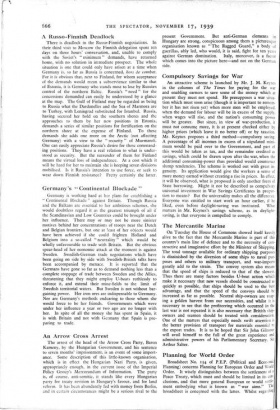A Russo-Finnigh Deadlock
There is deadlock in the Russo-Finnish negotiations. In their third visit to Moscow the Finnish delegation spent ten days on three hours' conversation, and, unable to comply with the Soviet's " minimum " demands, have returned home, with no solution in immediate prospect. The whole situation is one that could only have arisen at a time when Germany is, so far as Russia is concerned, hors de combat. For it is obvious that, next to Finland, for whom acceptance of the demands would mean a subservience similar to that of Estonia, it is Germany who stands most to lose by Russian control of the northern Baltic. Russia's " need " for the concessions demanded can easily be understood by a glance at the map. The Gulf of Finland may be regarded as being to Russia what the Dardanelles and the Sea of Marmora are to Turkey, with Leningrad substituted for Istanbul. Russia, having secured her hold on the southern shores and the approaches to them by her new positions in Estonia, demands a series of similar positions for fortification on the northern shore at the expense of Finland. To these demands she adds one more on the Arctic (not affecting Germany) with a view to the " security " of Murmansk. One can easily appreciate Russia's desire for these command- ing positions. They have a real relation to what is under- stood as security. But the surrender of them for Finland means the virtual loss of independence. At a cost which it will be hard for her to maintain she is keeping seven divisions mobilised. Is it Russia's intention to use force, or seek to wear down Finnish resistance? Pretty certainly the latter.




































































 Previous page
Previous page